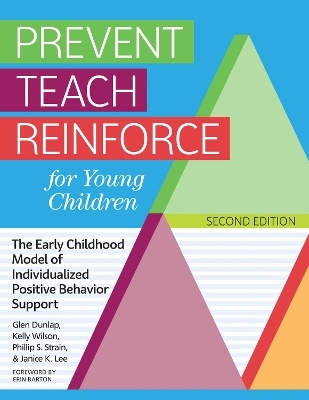
Prevent Teach Reinforce for Young Children
Brookes Publishing Co (Verlag)
978-1-68125-548-4 (ISBN)
The premier Tier 3 intervention for the Pyramid Model, Prevent‐Teach‐Reinforce for Young Children (PTR‐YC) is a research‐proven, family‐centered approach used in preschool settings nationwide to resolve persistent challenging behaviors. Now this bestselling PTR‐YC guidebook is in a thoughtfully revised second edition, with enhancements and additions informed by user feedback, the authors' training experiences, and new studies on the effectiveness of the model.
Developed by top behavior experts, this practical, reader‐friendly guidebook fully introduces the five steps of the PTR‐YC model: 1) teaming and goal setting; 2) data collection; 3) functional behavioral assessment; 4) development and implementation of a behavior intervention plan; and 5) using data, arranging for generalization, and next steps. You'll get instructions for conducting all five steps, case examples from real‐world experience, and the tools and assessment instruments you need to implement the steps effectively.
Ideal for use in a wide range of early childhood settings—including preschools, Head Start, and child care programs—this accessible guide will help you strengthen every young child's social‐emotional skills and address even the toughest behavior challenges.
WHAT’S NEW:
New chapter on classroom‐wide procedures that help prevent challenging behavior.
New chapter on interim solutions to extreme challenging behavior.
Updates and revisions throughout based on feedback from users over the last 8 years.
New evidence of the effectiveness of PTR‐YC, demonstrated by a recent randomized controlled trial and single case experimental analyses.
More on ensuring fidelity and sustainability, increasing the chances for long‐term positive outcomes.
Updated downloadable materials now online: checklists, rating scales, and a classroom practices assessment.
Glen Dunlap has worked in the areas of developmental disabilities, early childhood intervention, positive behavior support, and family support for approximately 45 years. He is one of the developers of the Pyramid Model and was an early founder of positive behavior support. He was the first editor of the Journal of Positive Behavior interventions and was editor for 10 years of Topics in Early Childhood Special Education. He also helped create the Prevent-Teach-Reinforce approach for addressing challenging behaviors and is an author of Prevent-Teach-Reinforce, Prevent-Teach-Reinforce for Young Children and Prevent-Teach-Reinforce for Families. Glen is currently affiliated with the University of Nevada in Reno, and enjoys his work supporting doctoral students and early career researchers, and helping to develop contributions to research and practice.
About the Downloads
About the Authors
Foreword by Erin Barton, Ph.D.
Acknowledgments
Section I: Foundations of Prevent-Teach-Reinforce for Young Children
1 Introduction to Prevent-Teach-Reinforce for Young Children, 2nd Edition
Appendix: Key Terms
2 Engaging Families in the PTR-YC Process
Appendix: Case Examples
3 Preventive Classroom Practices
4 Interim Procedures for Managing Dangerous Behavior
Section II: Implementing Prevent-Teach-Reinforce for Young Children
5 Step 1: Teaming and Goal Setting
6 Step 2: Data Collection
7 Step 3: PTR-YC Assessment (Functional Behavioral Assessment)
8 Step 4: PTR-YC Intervention
9 Step 5: Using Data and Next Steps
References
Appendix A: Interventions
Appendix B: Case Example: Joel
Appendix C: Case Example: Jessi
Appendix D: Case Example: Ethan
Index
| Erscheinungsdatum | 13.03.2022 |
|---|---|
| Verlagsort | Baltimore |
| Sprache | englisch |
| Maße | 210 x 271 mm |
| Gewicht | 275 g |
| Themenwelt | Sozialwissenschaften ► Pädagogik ► Sonder-, Heil- und Förderpädagogik |
| Sozialwissenschaften ► Pädagogik ► Sozialpädagogik | |
| Sozialwissenschaften ► Pädagogik ► Vorschulpädagogik | |
| Sozialwissenschaften ► Soziologie | |
| ISBN-10 | 1-68125-548-0 / 1681255480 |
| ISBN-13 | 978-1-68125-548-4 / 9781681255484 |
| Zustand | Neuware |
| Informationen gemäß Produktsicherheitsverordnung (GPSR) | |
| Haben Sie eine Frage zum Produkt? |
aus dem Bereich


